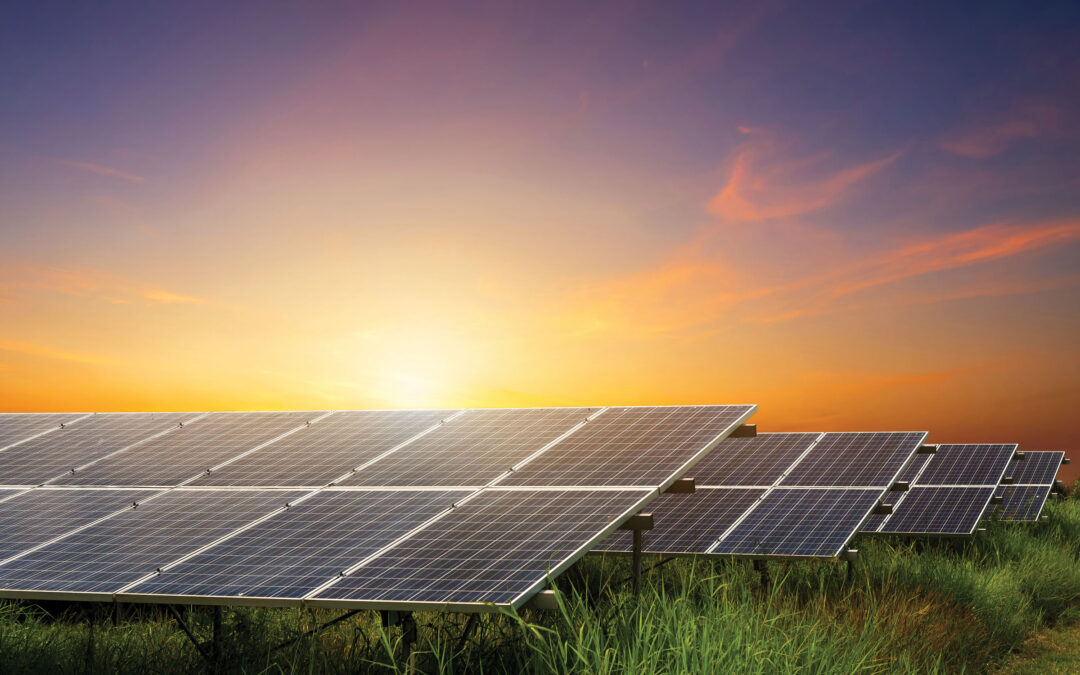
by Michael Vickerman | Dec 27, 2022 | Action Alert, Advocacy, Public Service Commission, Solar, Utility Scale
Saratoga Solar is a 150.5-megawatt solar project with a 50 MW battery energy storage system proposed in Wood County, near Wisconsin Rapids. As designed, Saratoga Solar would supply homegrown, affordable, emission-free electricity to power the equivalent of approximately 40,000 homes. If approved, Saratoga will begin producing clean power by the end of 2025. For more information, visit the application HERE and RENEW Wisconsin’s testimony HERE.
Solar projects larger than 100 megawatts must gain approval from the Public Service Commission of Wisconsin (PSCW) before they can proceed to construction. Along the way, there are opportunities for public comment at the township, county, and state levels.
Please help us demonstrate Wisconsin’s enthusiastic support for solar power in general and this project in particular by submitting a comment in support of Saratoga Solar. Be sure to specifically reference the project and the benefits that it can bring to Wisconsin. The deadline for submitting comments is January 6, 2023.
[Note: Your comments need not be as lengthy as the sample below, which was drafted to present a variety of supporting perspectives relating to health, environmental sustainability, and rural economic development. We encourage you to articulate the points that matter most to you. But it’s OK to frame your comments at a very high level if that’s what you’re comfortable with.]
SAMPLE COMMENT
I write in support of the Saratoga Solar project, presently under review at Docket No. 9816-CE-100. This project, like other combined solar and battery storage projects approved by the PSCW in recent years, would protect human health and the natural environment while strengthening the state’s economy.
Consistent with Wisconsin’s Energy Priorities Law, Saratoga Solar will provide these benefits by converting locally available, noncombustible renewable energy resource—sunshine—to electricity and feeding zero-emission into existing power lines and the battery energy storage system onsite. As configured, Saratoga Solar will displace fossil-fueled generation at all times, which will measurably reduce the volume of airborne pollutants and greenhouse gases discharged from Wisconsin sources.
In-state solar projects can be counted on to energize the local economy through increased revenues to local governments while diversifying our resource mix and bringing Wisconsin a step closer to energy self-sufficiency. The economic benefits come in two forms. Initially, Saratoga Solar will create more than 200 jobs in Wisconsin during the project’s construction phase. Second, Saratoga Solar, once placed in service, will provide rental income to participating landowners as well as payments in lieu of taxes to local jurisdictions hosting the project. Projects like these can also provide an economic hedge to farmers and rural landowners whose products are subject to commodity market forces and weather conditions that are beyond their control and can often be unforgiving.
In addition to the health and environmental benefits referenced above, Saratoga Solar will also deliver benefits to the land within its footprint. The developer proposes to revegetate the land with a mix of deep-rooted plants under and around the installation. Managing the land in this fashion will improve soil health, reduce erosion, and increase biodiversity.
I respectfully encourage the PSCW to find that the construction of the Saratoga Solar project is in the public interest and issue a permit enabling the project to proceed with construction.
Thank you for your consideration.
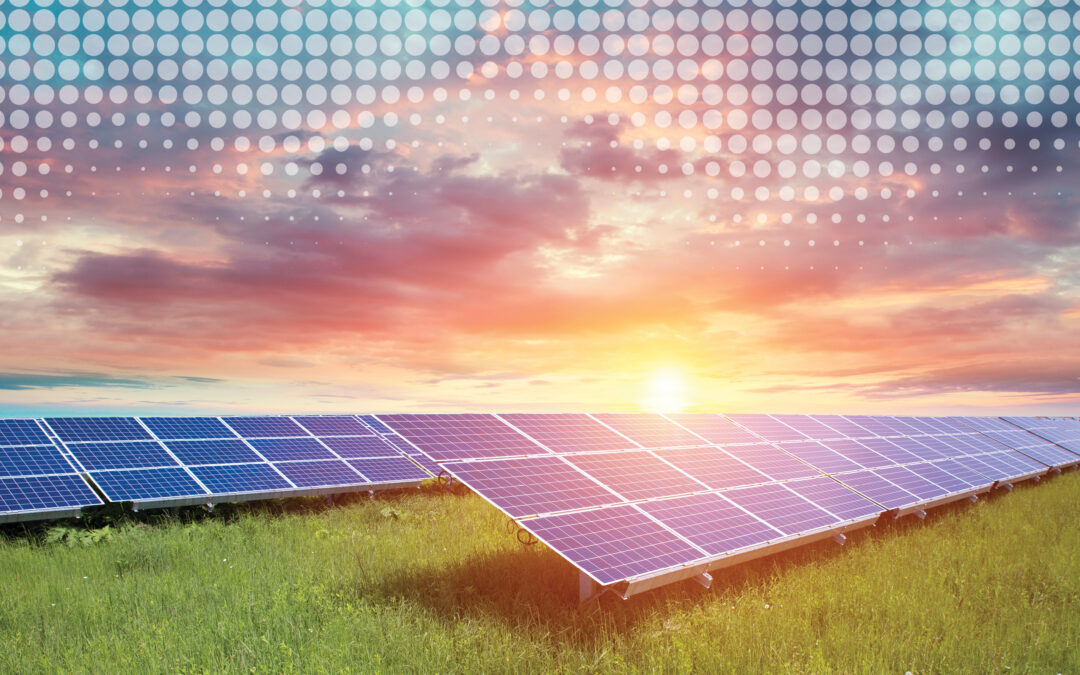
by Andrew Kell | Dec 27, 2022 | Electric Vehicles, Electrification, Energy Storage, Health, Netzero Wisconsin, Renewables, Solar, Wind
This past year, a Project Team consisting of RENEW Wisconsin, Clean Wisconsin, and GridLab commissioned Evolved Energy Research and Cambridge Econometrics to provide modeling, analysis, and reporting for a Wisconsin Zero Carbon Study. The recently released Summary Report provides an excellent overview of the Study results and policy recommendations. This RENEW blog provides additional context and insight into the next steps.
The Technical Report, titled Achieving 100% Clean Energy in Wisconsin, was completed this past summer and provides a first-of-its-kind, economy-wide modeling approach to envision a Wisconsin transition to a zero-carbon future by 2050. The modeling included 1) a baseline scenario as a comparison reference, 2) a 100% Clean Electricity scenario, 3) a Net Zero Economy-wide scenario (also referred to as NZEW), and four additional sub-scenarios that envisioned the NZEW scenario with policy and economic constraints. With NZEW by 2050 as a base assumption, these sub-scenarios further explored scenarios including a) No Transmission Expansion, b) Accelerated Clean Electricity, c) Delayed Action (of electric vehicle and building electrification), and d) Limited Coal and Gas.
The modeling results show a viable zero-carbon future by 2050, but it is a future that requires collaborative planning, supporting policies, and economy-wide investments.
A Grid Evolution
Wisconsin’s current resource portfolio relies heavily on fossil fuel-generating capacity. The figure below, which provides the baseline 2022 capacity assumptions from the model, shows that about 70% of Wisconsin’s current generating capacity relies on coal or fossil gas as fuel sources.
The following pie chart is listed in Gigawatts (GW).
In order to achieve a carbon-free future, clearly existing fossil fuel-generating capacity needs to be replaced with clean energy resources. However, when contemplating the decarbonization of all sectors of the economy, there also needs to be an expansion of generating capacity to serve Wisconsin’s electricity needs by 2050 – a lot more clean energy capacity.
Modeling of the NZEW scenario estimates that when Wisconsin decarbonizes the transportation, building, and other sectors, electricity use will increase by over 160% by 2050, well over doubling Wisconsin’s demand for electricity. Electrification of these sectors is often referred to as ‘beneficial electrification’ as the transition implies moving away from fossil fuels to decarbonized electricity as a fuel source.
To be truly beneficial, the timing of electric vehicle (EV) charging will be essential for load balancing and efficient use of utility infrastructure. This way, while overall electricity usage goes up dramatically, price signals, automatic controls, and utility programs will all allow EVs to charge optimally throughout the year. Currently, it is most economical to charge EVs at night when prices are low. In the future, it may also make sense to send signals to charge during peak solar production during the summer noontime.
The figure below illustrates the capacity expansion needed on the supply side to meet electricity demand growth.
As a result of decarbonization of the grid and beneficial electrification, Wisconsin's demand for electricity in 2050 would be supplied by an estimated 31 Gigawatts (GW) of solar, 21 GW of wind, 7 GW of storage, 7 GW of clean gas, 2 GW hydrogen electrolyzer capacity, and 3 GW of dual fuel electric industrial boilers located in Wisconsin. Of the 31 GW of solar, the model assumed about 2.5 GW would come from rooftop solar based on information from a solar rooftop potential study. Utilities would need to import additional clean energy capacity from outside Wisconsin. The model estimated that imported clean energy would come from about 9.3 GW of solar and 6.3 GW of wind from out-of-state resources.
The figure below provides a snapshot of the clean generation portfolio serving Wisconsin by 2050 under the Net Zero Economy-wide modeling results.
The following pie chart is listed in Gigawatts (GW).
Utility-scale clean energy resources at this scale also require the expansion of transmission investments. For each of Wisconsin’s interties with Minnesota, Iowa, and Illinois, the model estimates that 6 GW of transmission interties are needed for each of these three state interties. This equates to 18 GW of new transmission interties, which is about 3-to-4 times the amount of current Wisconsin transmission interties.
While gas capacity remains in all scenarios, gas serves as a reliability resource operating at just a 5% capacity factor and burning entirely clean, carbon-neutral fuels. In the ‘Limited Coal and Gas’ scenario, existing and less efficient gas units must remain online much longer and operate at much higher capacity factors because new, more efficient gas units are not allowed in this scenario.
In the ‘No Transmission Expansion’ scenario, in-state clean energy resources would have to expand by about 36% above the Net Zero Economy-wide scenario. In this scenario, all new generation capacity must be developed in Wisconsin, as higher capacity factor resources in other states cannot serve Wisconsin’s electricity needs. This scenario would also necessitate the expansion of ‘intrastate transmission’ within the borders of Wisconsin and add $1 billion in costs above the NZEW scenario.
Taking Emissions Down to Zero
In relation to a baseline scenario, the 100% Clean Electricity scenario will reduce total economy-wide carbon emissions by 24% by 2050. In this scenario, while the grid becomes carbon-free, transportation, building, and other sectors realize only modest decarbonization and still rely on fossil fuels to power cars, homes, and some industrial processes.
It is important to note that concentrating on the decarbonization of the electric grid by 2050 alone only gets Wisconsin to about a quarter of all reductions needed for a carbon-free future across all sectors of the economy. Additionally, in the Net Zero scenario, carbon sequestration and bunkering measures are needed to reduce emissions that come from marginal fossil gas resources. By 2050, a small segment of industries will still emit carbon, either because it is too costly to do otherwise or not technically feasible to eliminate completely. To achieve the target of zero emissions by 2050, the model chooses to rely on carbon sequestration, in which carbon is captured before being released into the atmosphere and then piped via pipeline to appropriate geologic sequestration areas in the country, safely sequestering the carbon.
A Real Benefits Plan
Following the Technical Report, Cambridge Econometrics released a report on The Economic Impacts of Decarbonization in Wisconsin. In combination with health outcomes modeled by Evolved Energy Resources, benefits of the Net Zero Economy-wide scenario include:
- $2 to $4.4 billion in avoided healthcare costs in 2050,
- 28 to 63 fewer deaths per million people from air pollution by 2050,
- 3% growth in Wisconsin’s Gross State Product by 2050, adding around $16 billion to Wisconsin’s economy,
- 68,000 additional Wisconsin jobs, and
- Lower energy costs for Wisconsin’s residents.
The benefits of a zero-carbon future outweigh the costs of the transition per the modeling results. Focusing on energy costs alone, economy-wide investments in renewable resources, heat pumps, EVs, etc., increase by about $111.1 billion in present value. However, the benefits of avoiding fossil fuel costs are about $110.6 billion in present value. When you add the health and economic growth benefits listed above, the net-zero investment makes sense from a business case perspective.
Jenna Greene, RENEW’s Energy Policy Fellow, is currently performing a cost-benefit analysis of the modeled scenarios using the Technical Report and Economic Impacts Report results. When cost-benefit results are available, this blog will be updated.
How We Get There
The transition to a zero-carbon future won’t be easy, as infrastructure build-out, technological innovation, and market development will be needed over the next few decades. As a result, we will need to form public-private partnerships, enact and implement policies, and design cross-sector planning processes that support this transition to ensure it is cost-effective. For quick reference, below is a set of key recommendations from a figure on page 19 of the Summary Report. A complete list of policy actions is provided at the conclusion of the Summary Report.
The release of our Zero Carbon Study is just the start of a dialog on how Wisconsin can reach zero carbon emissions by 2050. The Project Team is further collaborating with partners, businesses, legislators, and state and local government officials on the next steps. For further information, please contact Andrew Kell, Policy Analyst at RENEW Wisconsin, at andrew@renewwisconsin.org.
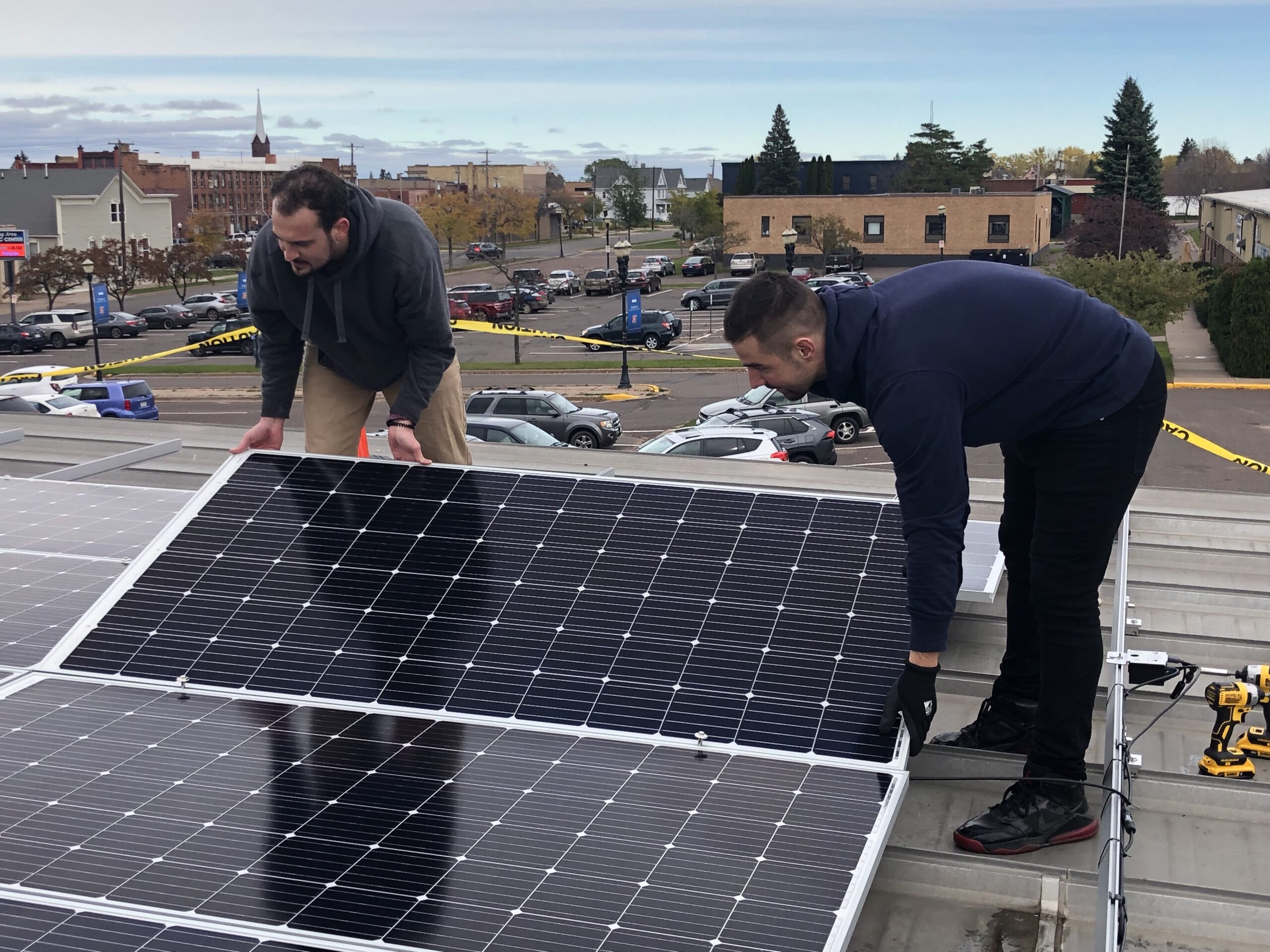
by RENEW Wisconsin | Dec 16, 2022 | Community, Local Initiatives, Press Release, Solar for Good
MADISON, WI – The Solar for Good grant program has awarded over $120,000 in grants and solar panel donations to Wisconsin nonprofit organizations. Thirteen nonprofits will install approximately 460 kilowatts of solar electricity, leading to more than $1.2 million in renewable energy investments in Wisconsin.
The following organizations have been offered Fall 2022 Solar for Good grants to install new solar energy systems:
Chequamegon Humane Association – animal shelter, Ashland
Cinnaire Solutions – affordable housing, Lac du Flambeau
Clyde Community Center – community service, Avoca
Friends of Sauk Prairie Parks & Recreation – community service, Prairie du Sac
Harry and Rose Samson Family JCC – religious, Mequon
Peace Lutheran of Pigeon Falls – religious, Pigeon Falls
People’s United Methodist Church – religious, Oregon
Racine Dominican Eco-Justice Center – community service, Racine
Rotary Club of Greater Portage County – community service, Stevens Point
Shirley M. Wright Memorial Library – community service, Trempealeau
St. Dunstan’s Episcopal Church – religious, Madison
WAFER Food Pantry – meal distribution, La Crosse
* One organization has asked to remain anonymous at this time.
The nonprofit grant recipients from the Fall 2022 round represent a wide range of organizations across Wisconsin. Cinnaire Solutions, an affordable housing provider, will install 100 kilowatts of solar at their Forest Edge development in Lac du Flambeau, which will directly provide energy to 40 low-income tenants. The Rotary Club of Portage County is working with students from Mid-State Technical College to install a 7-kilowatt solar system on top of the Salvation Army Hope Center in Stevens Point. And the Shirley M. Wright Memorial Library will install 60 solar panels at the public library in Trempealeau.
“The Solar for Good grant is a transformative addition to this project,” stated Elizabeth Rask of Cinnaire Solutions. “Solar infrastructure is rarely included in affordable housing developments due to cost. With Solar for Good’s support, we will be able to install photovoltaic infrastructure, which will reduce the cost to residents and ensure long-term sustainability.”
The main stipulation of the grant requires each organization to highlight its solar project in the community and educate its members about the benefits of renewable energy.
“This project is a true community collaboration involving the Rotary Club of Greater Portage County, the Salvation Army, Mid-State Technical College, the Community Foundation of Central Wisconsin, and the local community of professional solar installers,” said Ben Nusz of the Rotary Club of Portage County. “The completed installation will leave a lasting impact on an organization in great need.”
The 13 nonprofits are a part of Solar for Good’s 11th round of funding. The program has offered solar grants to 161 Wisconsin-based nonprofits since it began in 2017. When all projects are complete and energized, Solar for Good grant recipients will add over 7.6 megawatts of renewable energy to Wisconsin’s electric grid, providing enough electricity to power approximately 1,600 Wisconsin households.
###
About Solar for Good RENEW Wisconsin’s Solar for Good initiative fosters the expansion of solar power among mission-based nonprofits and houses of worship in Wisconsin. Through a generous partnership with Couillard Solar Foundation, RENEW Wisconsin awards grants and solar panels to nonprofit organizations, helping them switch to clean, renewable, solar energy.
About RENEW Wisconsin RENEW Wisconsin is a nonprofit organization that promotes renewable energy in Wisconsin. We work on policies and programs that support solar power, wind power, biogas, local hydropower, geothermal energy, and electric vehicles. www.renewwisconsin.org.
About Couillard Solar Foundation the Couillard Solar Foundation is a 501c3 nonprofit whose mission is to further the urgent path to decarbonization for Wisconsin and create a cleaner, safer environment for everyone, regardless of socio-economic status. The Couillard Solar Foundation helps schools and nonprofits gain vital access to solar power by providing solar panels, programs, and education through the Solar for Good and Solar on Schools grant programs. For more information, please visit www.CouillardSolarFoundation.org
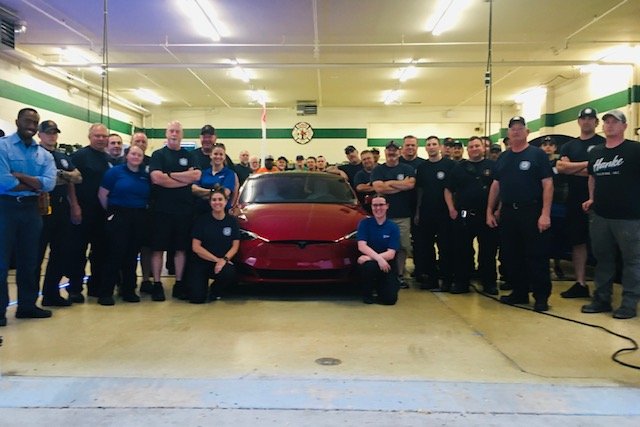
by Francisco Sayu | Dec 16, 2022 | Electric Vehicles, Local Initiatives, Programs, RENEW Wisconsin
RENEW Wisconsin awarded an EVs for Good grant of $5,000 to EVsafe to support first responder training in accidents involving electric vehicles (EV) and other electric infrastructure-related emergencies.
EVsafe is a Wisconsin-based nonprofit supporting our nation’s first responders through specialized EV training to increase safety and efficiency when responding to emergencies. The grant will support the purchase of a salvaged vehicle for EVsafe’s “break-apart” EV training program. This vehicle will support training on disabling high voltage systems, extinguishing electrical fires, and other challenges unique to electric vehicles.
RENEW Wisconsin’s EVs for Good grant program reduces the upfront costs of purchasing electric vehicles and EV charging infrastructure for nonprofits in Wisconsin. This grant is possible thanks to a generous donation from Carol and Andy Phelps.

by Jodi Jean Amble | Dec 14, 2022 | Community, Press Release, Solar
December 14, 2022 – SUN PRAIRIE, WI, has been selected by the National Renewable Energy Laboratory (NREL) as one of 12 communities nationwide to adopt the innovative solar permitting platform SolarAPP+. Through the program, Sun Prairie is eligible to receive $15,000 if SolarAPP+ is adopted successfully.
“We’re excited to see NREL’s announcement and the fact that residential solar is receiving its time in the spotlight in Sun Prairie,” said Sam Dunaiski, Executive Director of RENEW Wisconsin. “This platform will help Wisconsin households remove barriers to accessing solar energy.”
SolarAPP+ is an online platform that instantly issues permits for code-compliant residential rooftop photovoltaic (PV) and battery systems. As many consumers and local jurisdictions know, permitting can often slow the process for residential solar and battery installations. Current permitting delays are estimated to increase the cost of solar by $7,000 per project. With the convergence of increased consumer interest in solar installation and federal legislative momentum, clearing this potential bottleneck of long review timelines and complicated permitting applications is imperative. SolarAPP+ provides local governments, installers, and homeowners with a streamlined process to quickly achieve clean power generation from the sun.
Burke O’Neal, co-owner of Full Spectrum, a solar installer based in Madison, WI, is looking forward to Sun Prairie using the SolarApp+ platform to standardize the residential solar permitting process and make it more efficient cost-effective. “Widespread adoption of the program will reduce system costs and speed up installations,” he said. “This means more homeowners will be able to cut their energy bills with a photovoltaic system on their own roof.”
SolarAPP+ has approved more than 10,000 permits across jurisdictions, including successful programs in Arizona, California, Illinois, and Texas. Since SolarAPP+ provided an immediate permit for those communities vetted and determined to be eligible, projects have been installed about two weeks faster under the program.
“The City of Sun Prairie applied to participate in the SolarAPP+ competition to explore the tool and better understand how our permitting process could utilize support from NREL,” said Scott Semroc, Sustainability Coordinator for the City of Sun Prairie. “The city will learn more about the potential integration of the SolarAPP+ platform to augment our existing permitting process, potentially reducing permitting time, freeing up Building Maintenance staff capacity, and overall enabling community investment in renewable energy resources by lowering barriers and streamlining the Solar PV permit process for 1-2 family residences. We are excited to participate in this challenge with our peer communities and further explore this opportunity.”
To see the existing residential Solar PV permit application for the City of Sun Prairie, visit the City of Sun Prairie’s website.
In Sun Prairie and across Wisconsin, RENEW Wisconsin continues to work tirelessly to ensure programs like SolarAPP+ and others are helping both new and existing solar customers reap benefits from their rooftop PV systems. RENEW hopes this first step inspires more local governments to use this free platform to cut red tape and reduce costs for every taxpayer and government entity.
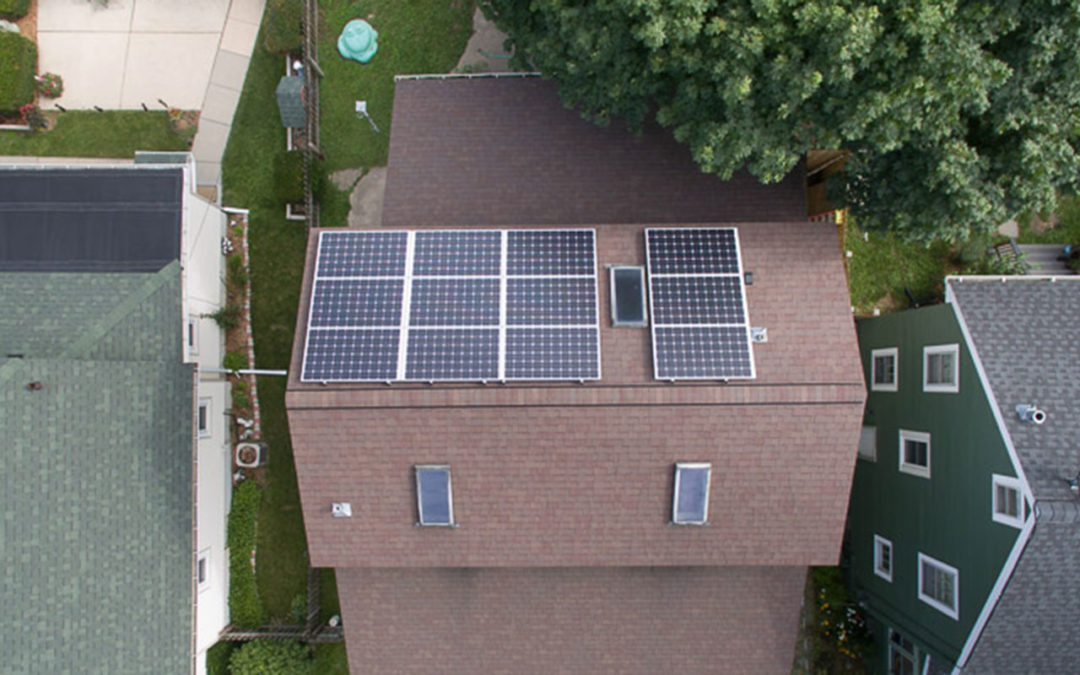
by Michael Vickerman | Dec 2, 2022 | PSC Priorities, Public Service Commission, Solar
Public Service Commission affirms the legality of a private contract between a utility customer and a solar provider
For a central Wisconsin family seeking to supply their home with affordable solar power, December 1, 2022, was a day worth celebrating. The Public Service Commission (PSC) ruled that their bid to access electricity under contract from a third-party-owned solar PV system on their rooftop would not conflict with Wisconsin’s public utility law.
This Declaratory Ruling arose from a petition filed in May by Vote Solar, a national solar energy advocacy organization, on behalf of one of its members, a family residing in Stevens Point. The ruling clears the way for the Vote Solar member to host an eight-kilowatt solar array and pay for that electricity under contract with a third party instead of purchasing the system and absorbing the costs upfront. The third-party provider named in this petition is Northwind Renewable Energy Cooperative, based in Amherst.
While existing law does not prohibit third-party ownership of generating equipment located on the customer’s premises, it does not expressly sanction this type of arrangement either.
In their testimony and briefs opposing Vote Solar’s petition, electric providers argued that any provision of electricity to the family by a third party, whether under a lease or a power purchase agreement, would automatically make Northwind a public utility operating illegally in another utility’s territory. Given that Wisconsin utilities have in recent years denied interconnection to customers seeking to host third-party-owned solar PV systems, Vote Solar felt it necessary to request a Declaratory Ruling on behalf of its member to clarify that the family is not “the public” and that Northwind is not a public utility. Vote Solar was represented by attorney Tim Lindl of Keyes & Fox LLP in this proceeding.
As noted in Vote Solar’s reply brief, “the utility position that two homes with the same equipment, installed the same way, connected to the same utility—with absolutely no functional difference—should be categorized differently simply because of the way the system is financed defies logic and common sense.”
A number of stakeholder comments filed in this proceeding took aim at that argument, such as the example below from Kurt Reinhold, president, and managing director of Legacy Solar Cooperative.
“Anytime someone replaces older HVAC equipment or older lighting fixtures, they are doing what they can (behind the electric and gas meters) to reduce their power demands and energy needs. It’s the same thing with solar power. If a family or an institution decides they want to use solar power to meet some of their power and energy needs, and rely less on fossil fuels, and lower their electric bills in the process, then no utility or regulatory authority should impinge upon the rights of the customer to do that. It should not matter if they take a loan, pay cash, or enter into a service agreement or lease to do so.”
Contrary to the utilities’ hyperbole, affirming the legality of the family’s PV project will not lead to dismantling Wisconsin’s regulatory utility model, as demonstrated in neighboring states like Iowa. As noted by RENEW Policy Director Michael Vickerman:
“Back in 2014, the Iowa Supreme Court ruled in favor of a similar petition filed by a local solar contractor, affirming the legality of third-party-owned generation serving host customers. That decision removed a significant economic barrier that kept nonprofit entities from pursuing onsite solar power. Access to financing opened the solar door to many school districts and local governments across the state. All have reported significant savings from the solar installations serving their facilities.”
Vickerman added, “There is simply no basis for believing that our state’s experience with third-party-financed distributed energy systems would track any differently than what we’ve seen in Iowa. But if we want to broaden solar power’s affordability and make it accessible to low-to-middle income residential customers, small businesses, hospitals, schools, local governments, places of worship, CAP agencies, and other nonprofits, we will need to allow customer use of financing from third-party institutions consistent with the framework described in the Vote Solar petition.”
Several commenters in the Vote Solar docket referenced a number of innovative clean energy projects that used third-party financing. Foremost among them is Bad River Tribe’s Ishkonige Nawadide solar microgrid project commissioned in 2021, consisting of 524 kW of solar and 1,000 kWh of storage capacity. As described by Dan Nordloh, senior vice president, and general manager of EnTech Solutions:
“As a clean energy company based in Menasha, we recently completed a microgrid project for the Bad River Tribe in Ashland using TPF [third party financing], sometimes referred to as an energy-as-a-service model. In 2016 a storm wiped out power to the tribe, leaving them stranded for days… We were able to assist them with the financing because the tribe is a sovereign nation and not subject to Wisconsin law. This system would not have been possible without the flexibility of TPF [third party financing].”
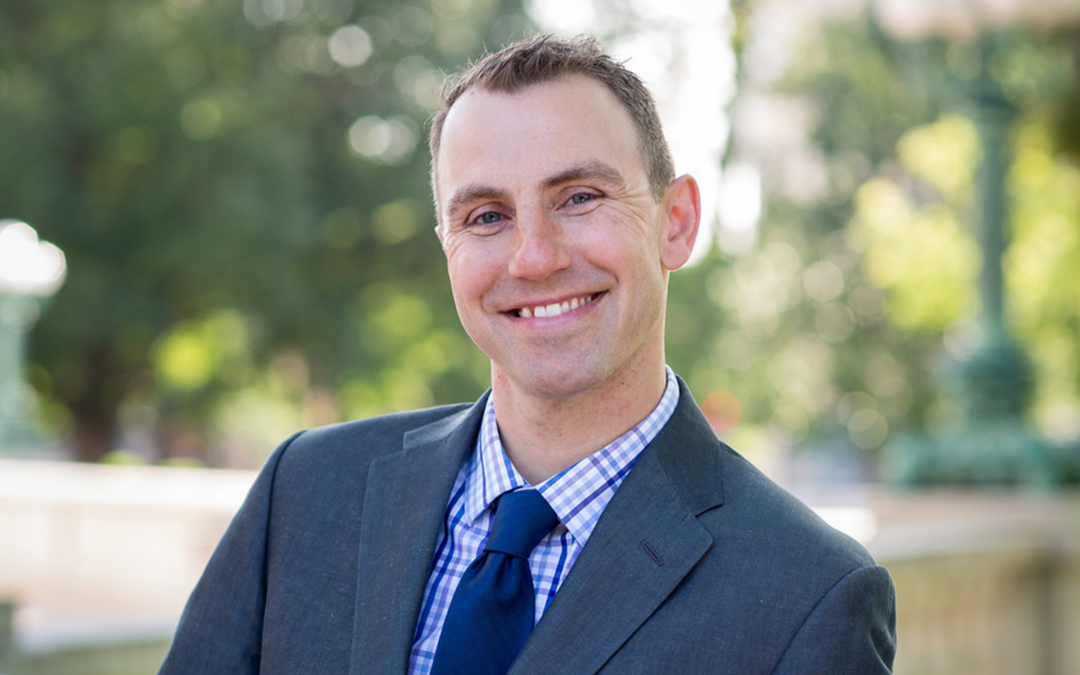
by Jodi Jean Amble | Nov 21, 2022 | RENEW Wisconsin
RENEW Wisconsin has named Sam Dunaiski as Executive Director. Mr. Dunaiski was hired as RENEW Wisconsin Program Manager in July 2018 and moved into the Distributed Resources Director position in October 2020. Before joining RENEW, he served as an operational meteorologist, creating detailed weather forecasts for utilities, agriculture groups, radio stations, and other clients.
“I am very pleased that Sam will become RENEW’s next Executive Director,” said Michael Vickerman, Policy Director at RENEW Wisconsin. “Sam’s leadership will be a crucial factor as we prepare for the next chapter of Wisconsin’s clean energy transition. It is our goal to make clean energy accessible, affordable, and available for anyone who desires it. This will involve engaging the many constituencies who have much to gain from actively taking part in Wisconsin’s journey towards a zero-carbon future. Sam has the drive and the skill set necessary to make that happen.”
RENEW’s Board President Amy Seeboth Wilson added, “The RENEW Board is ecstatic to work with Sam in this new role. He is a true champion for our mission, first volunteering with us in 2017 before joining our staff in 2018 and taking on increasing responsibility within the organization. Sam is committed and passionate- we cannot imagine a better person to lead us into this period of pivotal growth and transition for Wisconsin’s renewable energy future!”
“I am honored to lead RENEW Wisconsin at this transformational time for clean energy,” Mr.Dunaiski said. “With unprecedented legislation in the Inflation Reduction Act and Infrastructure Investment and Jobs Act, our work is more important than ever. RENEW will work towards bipartisan implementation of these new laws and increased access to the benefits of solar, wind, biogas, local hydropower, and building and transportation electrification.”
“This is an incredible opportunity to invest in Wisconsin communities and keep our energy dollars in state,” he continued. “We are committed to ensuring all Wisconsinites can reap the benefits of clean energy and will continue our work towards building a healthier, smarter Wisconsin through the advancement of clean energy.”
Sam has served on numerous committees and working groups addressing renewable energy, sustainability, and climate change, including co-chairing the Sustainable Madison Committee. He has a Bachelor of Science degree in Atmospheric and Oceanic Sciences from the University of Wisconsin-Madison.
Other advocates and industry professionals applauded Mr. Dunaiski’s appointment.
“In both volunteer and professional capacities, Sam is a champion for renewable energy in our community and a tremendous partner. From co-chairing the City of Madison’s Sustainable Madison Committee to helping us expand the MadiSUN program, Sam’s leadership has been a key to success. I’m excited to see him take on the role of Executive Director at RENEW.”
-Jessica Price, Sustainability and Resilience Manager, City of Madison
“Sam has been the Solar for Good grant program coordinator for the Couillard Solar Foundation for the last five years. He is as dedicated and committed to our mission as we could hope, and we know that he will bring that same commitment to his new role as RENEW Wisconsin’s Executive Director. Personally, I’ve worked with Sam closely over this last year when I stepped into my role at the foundation and I couldn’t be happier to see his achievement.”
– Jackie Harrison-Jewell, Executive Director, Couillard Solar Foundation
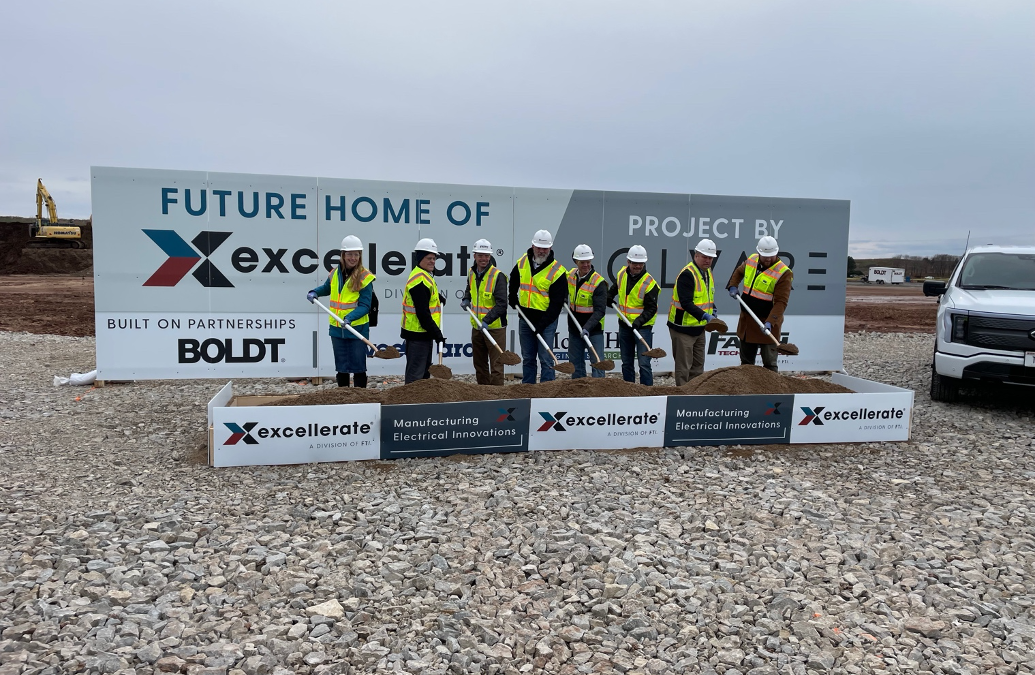
by Jim Boullion | Nov 15, 2022 | Jobs, Microgrids
On Monday, November 14, 2022, Excellerate, the manufacturing division of Faith Technologies Incorporated (FTI), held a groundbreaking event in the Village of Little Chute to recognize the start of construction for a new 385,000-square-foot facility that will support their growing manufacturing needs. In this space, they will be able to further streamline their existing manufacturing processes, increasing productivity and quality while minimizing waste. This site will be the hub for their work on clean energy microgrids, modular builds, and specialty engineering. The project is expected to be completed in the fall of 2023. The Boldt Company, is the general contractor on this building project and a leader in renewable energy construction.
Attending the event to learn more about Excellerate and the jobs that this exciting new manufacturing facility will create were State Senator Rob Cowles (Senate District 2-Green Bay) and Representative-elect Joy Goeben (Assembly District 5 – Green Bay).
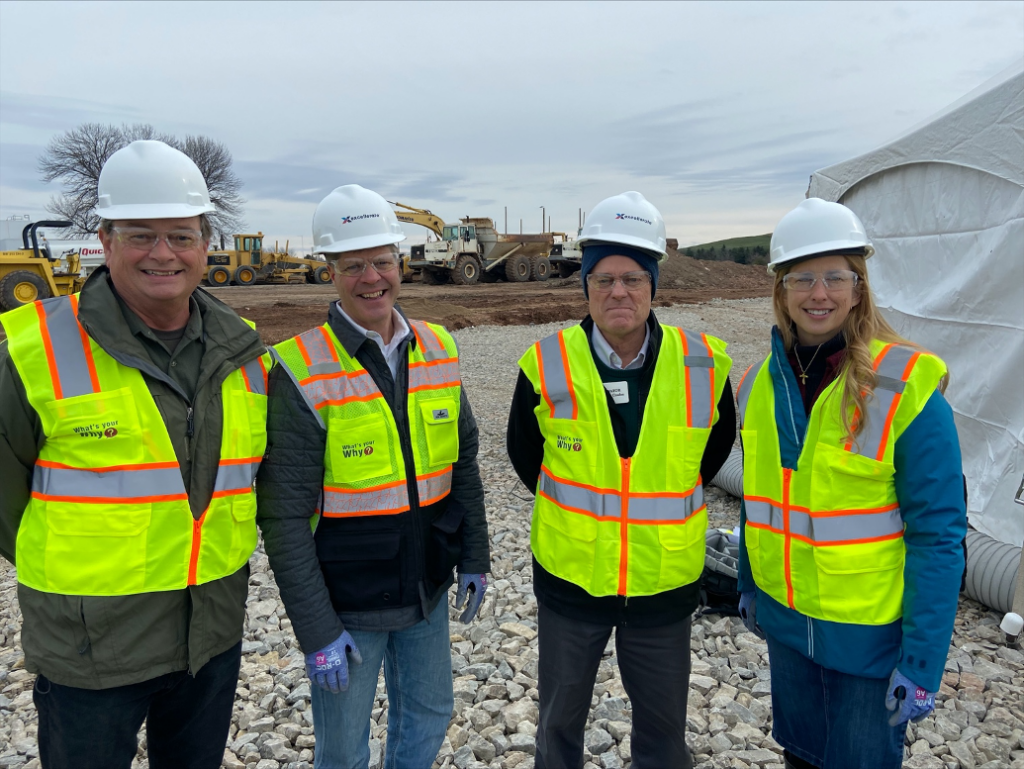
Left to right: Jim Boullion, RENEW Wisconsin; Mike Jansen, CEO, Faith Technologies, Inc.; Senator Rob Cowles; Representative Elect Joy Goeben.
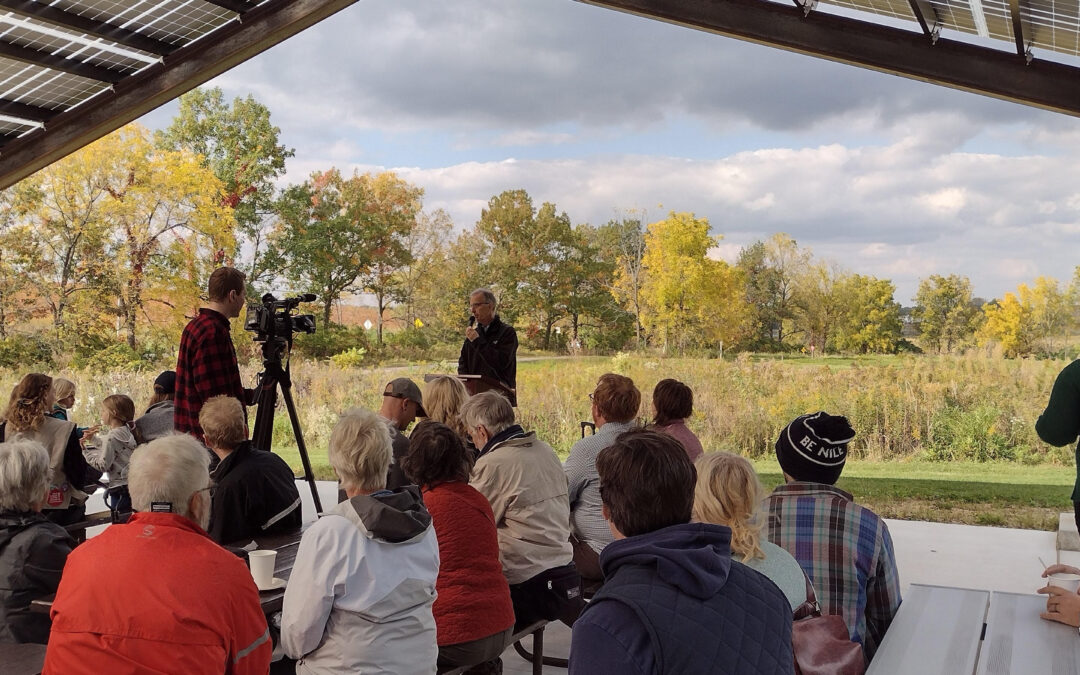
by RENEW Wisconsin | Oct 31, 2022 | Advocacy, Community, Local Government, Local Initiatives, Press Release, RENEW Wisconsin
On Thursday, October 6th, County Executive Joe Parisi joined the Office of Energy and Climate Change (OECC) to recognize local entities leading on climate action through Dane County’s Climate Champions program. The aim is to celebrate local leadership in fulfilling the goals outlined in Dane County’s Climate Action Plan, which commits Dane County to reduce greenhouse gas emissions 50% county-wide by 2030 and puts the county on a path to be carbon-neutral by 2050.
This year 87 Climate Champions are being awarded, representing 77 organizations. The Office of Energy & Climate Change recognizes achievements across ten categories, including:
- Building Energy Use -for entities with very energy-efficient buildings.
- Building Design -for still-under-construction facilities projected to be very energy efficient.
- Fleet Operations -for entities with a fleet powered by clean fuels.
- Employee Commuting -for entities where the workforce commutes via bike, walking, transit, or telecommuting.
- Water Saving Practices -for entities that have implemented practices to reduce water usage.
- Waste Diversion Practices -for entities that have strong waste diversion practices.
- Sustainable Land Use Practices -for farms and land with strong sustainability practices.
- Catalysts -entities that help others take climate actions.
- GHG Emissions -for entities that have reduced their carbon footprint.
- Other -for entities that have taken actions that don’t fit into other categories.
Entities that achieve Climate Champion status receive signage and recognition on the OECC website.
“We are excited to celebrate another cohort of Climate Champions,” said Dane County Executive Joe Parisi. “The leadership these organizations are taking to enhance their sustainability and meet our climate goals is admirable and inspiring to others.”
Each Climate Champion category has four levels of distinction, with four stars indicating the highest level of achievement in that category. In 2022, six entities representing three projects are receiving four stars. These entities include design craft Advertising, Greater Madison MPO, Madison Friends Meeting (Religious Society of Friends), and its building team: Ferch Architecture, Ideal Builders, and Full Spectrum Solar.
Additionally, nine local entities are earning awards in two or more categories, including design craft Advertising; Mad Local Food Group LLC, dba “Pasture and Plenty”; Madison Christian Community; Middleton Community Church, UCC; Monona Grove School District; Summit Credit Union; Sun Prairie Area School District; UW-Madison; and Willy Street Grocery Cooperative.
“The Climate Champions program is an important way for us to recognize how organizations across the county are helping to accelerate climate action. We are energized by how much this program has grown since its inception and are hopeful the actions these organizations are taking can spur additional action across Dane County,” Parisi added.
The full list of 2022 Dane County Climate Champions:
- AprilAire – AprilAire achieved 2022 Climate Champion (Catalyst) status for developing ENERGY STAR-certified dehumidifiers and fresh air ventilators that help customers make their homes more energy efficient.
- Arch Solar – Arch Solar achieved 2022 Climate Champion (Catalyst) status for helping over 100 homeowners install nearly 1 MW of solar in Dane County over the past two years. In addition, Arch Solar volunteers with renewable energy nonprofits to educate the community about solar and related technologies and has received grants to grow the solar workforce in underserved areas.
- Bayview Foundation and its construction partners Horizon Development Group, Kubala Washatko Architects, SmithGroup, Spire, and Design Engineers – Bayview Foundation and partners achieved 2022 Climate Champion (3 Star/Building Design) status for their redevelopment of the Bayview affordable housing units and community center. These apartment buildings and community centers incorporate high energy efficiency features, including Passive House for the Community Center and ENERGY STAR for the townhomes. The facility is projected to use just a quarter of the energy used by comparable facilities.
- Belle Farm – Belle Farm achieved 2022 Climate Champion (3 Star/Other) status for the Belle Farm development. The 44-acre eco/agri/wellness neighborhood in Middleton is planned to create a sustainable, walkable community of 880 dwelling units. To achieve near-net zero, all facilities will use geothermal heating and cooling, rooftop solar, passive design measures, and robust EV capabilities.
- Biological Farming Friends – The Biological Farming Friends achieved 2022 Climate Champion (3 Star/Sustainable Land Use) status for sustainable land practices, including using cover crops, reducing fertilizer and chemical inputs, and increasing the use of no-till agriculture on over 10,000 acres since 2018, as well as adopting rotational grazing on over 500 acres. Creating resilient farming systems has reduced carbon emissions and sequestered carbon on marginal cropland through perennial covers.
- Boys & Girls Clubs of Dane County and its construction partners OPN Architects, JSD, Hooper, Staff Electric, and Dave Jones Plumbing – Boys & Girls Clubs of Dane County and partners achieved 2022 Climate Champion (1 Star/Building Design) status for their new Workforce Training Center. The center will use approximately 25% less energy than a comparable facility and include geothermal heating and solar panels to support student learning about sustainable construction.
- Capital Area Regional Planning Commission – The Capital Area Regional Planning Commission achieved 2022 Climate Champion (3 stars/Employee Commuting) status for 90% of employees regularly telecommute, bike to work, or take mass transit to work than driving alone.
- City of Madison
- The City of Madison achieved 2022 Climate Champion (3 Star/Building Energy Use) status for Fire Station 13, which uses around 75% less energy than similar buildings through a combination of solar power, geothermal, and passive lighting systems that are efficient and cost-effective.
- The City of Madison achieved 2022 Climate Champion (2 Star/Building Energy Use) status for Pinney Library, which uses over 50% less energy than a comparable building. The LEED® Gold building has geothermal energy and LED lighting with daylight sensors.
- The City of Madison achieved 2022 Climate Champion (1 Star/Building Energy Use) status for the Police Training Center, which uses about 25% less energy than a comparable building.
- The City of Madison achieved 2022 Climate Champion (1 star/Building Energy Use) status for the Water Utility Building, which uses approximately 25% less energy than a comparable building.
- City of Sun Prairie – The City of Sun Prairie achieved 2022 Climate Champion (2 Star/Employee Commuting) status for creating policies such as telecommuting, carpool facilitation, and emergency rides that encouraged 45% of employees to choose not to drive alone to work.
- Cooper’s Tavern – The Cooper’s Tavern achieved 2022 Climate Champion (1 Star/Other) status for using local, organic, and sustainably sourced food to reduce emissions for transporting food; working to recycle fryer oil into biodiesel for farmyard vehicles; partnering with university students to turn food waste into compost, and using recycled materials in takeout packaging and other paper materials.
- Couillard Solar Foundation – Couillard Solar Foundation achieved 2022 Climate Champion (Catalyst) status for helping 41 sites in Dane County acquire a total of 2.58 MW of solar power via grants to nonprofits and schools.
- CUNA Mutual Group and its construction partners Eppstein Uhen Architects (EUA) and Affiliated Engineers (AEI) – CUNA Mutual Group and partners achieved 2022 Climate Champion (1 Star/Building Design) status for their rebuilding of the 5810 Mineral Point Road building. The energy-efficient building will use approximately 25% less energy than a comparable building. It will support employee well-being and offer outdoor spaces with native vegetation, while captured rainwater will be used for irrigation and building flush fixtures, saving 348,000 gallons of water a month.
- designCraft Advertising – DesignCraft Advertising achieved 2022 Climate Champion (4 Star/Employee Commuting) status for allowing all employees to telecommute rather than travel to the office in person. They also achieved 2022 Climate Champion (2 Star/Greenhouse Gas Emissions) status for having corporate emissions lower than 70% of their peer companies.
- Door Creek Orchard – Door Creek Orchard achieved 2022 Climate Champion (3 Star/Sustainable Land Use) status for sustainable land practices on the 80-acre property since 1984. These include reduced or no-till agriculture, continuous cover crops, increased nitrogen use efficiency, active tree maintenance, rotational grazing, controlled burns, and 16-plus acres of prairie/wetland restoration.
- Drews Solar LLC – Drews Solar achieved the 2022 Climate Champion (Catalyst) for installing rooftop solar arrays and electric car chargers to help families produce 90-110% of their annual electricity needs. The company is on track to install over 2,000 solar panels in 2022.
- Edgerton Hospital – Edgerton Hospital achieved 2022 Climate Champion (1 Star/Building Energy Use) status. The hospital, which features geothermal heating and cooling, uses about 25% less energy than a comparable hospital. Edgerton Hospital was the first hospital in Wisconsin to be built with geothermal heating and cooling.
- Filament Games – Filament Games achieved 2022 Climate Champion (3 Star/Employee Commuting) status for allowing all employees who would like to work from home to do so, resulting in less than 6% of employees regularly driving alone. This also allowed the office to downsize to less than a tenth of its previous square footage when the company’s employee count is the highest it’s ever been.
- First Unitarian Society of Madison – First Unitarian Society of Madison achieved 2022 Climate Champion (1 Star/Building Energy Use) status. Solar power and energy-efficient features enable this campus to use about 25% less energy than comparable facilities. FUS Madison achieved LEED® Gold status in 2009 with a modern addition that featured ground source heat pumps. After the addition, the FUS green team continued to pursue energy savings with a large solar array and smart HVAC management.
- Girl Scout Troops #1477 & #1952 – Girl Scouts of Wisconsin Badgerland Council – Girl Scout Troops #1477 and #1952 achieved 2022 Climate Champion (Catalyst) status for their advocacy to reduce the embodied carbon of building materials, including concrete. Through two videos and various in-person and virtual presentations, the Girl Scouts reached thousands of building professionals worldwide. Locally they inspired the City of Madison Engineering Department to explore low-carbon concrete options and hosted a virtual roundtable to facilitate dialogue between local building industry groups.
- Glass Nickel Pizza Co, West – Glass Nickel Pizza Co, West achieved 2022 Climate Champion (1 Star/Other) status for taking sustainable actions every day, including shopping locally, using recycled materials, reducing single-use plastics, composting, and recycling fryer grease.
- Greater Madison MPO – Greater Madison MPO achieved 2022 Climate Champion (4 Star/Employee Commuting) for encouraging alternate transportation options so that no employees regularly commute to work by driving alone.
- Green Box, LLC – Green Box achieved 2022 Climate Champion (Catalyst) status for collecting and composting 26,000 pounds of food waste in seven months, preventing that waste from ending in a landfill, and producing methane.
- HGA – HGA achieved 2022 Climate Champion (Catalyst) status for working with clients to design energy-efficient new and retro-commissioned buildings with renewable energy and reduced embodied carbon. Recent HGA clients include SSM Health, Sun Prairie School District, Oregon School District, and Middleton Business Park.
- Holy Wisdom Monastery – Holy Wisdom Monastery achieved 2022 Climate Champion (3 Star/Sustainable Land Use) status for sustainable land practices, including 190 acres of continuous cover, 170 acres managed with controlled burns, 130 acres of native prairie restoration, and a restored lake.
- Legacy Solar Co-op – Legacy Solar Co-op achieved 2022 Climate Champion (Catalyst) status for increasing solar education and adoption of solar in Dane County. In 2020 and 2021, they educated hundreds of residents and supported 32 installations for 245 kW of solar. Legacy Solar Co-op (LSC) is a statewide member-owned cooperative that provides expert consulting and financing services to facilitate solar projects for communities and nonprofits in Wisconsin.
- Mad Local Food Group LLC, dba “Pasture and Plenty” – Pasture and Plenty achieved 2022 Climate Champion (3 Star/Waste Diversion Practices) status for diverting at least 60% of their waste from the landfill via minimizing packaging and other raw materials, incentivizing reuse, reducing contamination of the waste streams, recycling, and composting. Pasture and Plenty also achieved 2022 Climate Champion (2 Star/Greenhouse Gas Emissions) status for having fewer emissions than at least half of the comparable businesses. Pasture and Plenty achieved lower emissions via bike delivery of meal kits, buying local food, reducing energy usage in their building, and buying green power. Pasture and Plenty advocates for environmental equity through food access programs, community classes, and training.
- Madison Christian Community – Madison Christian Community achieved 2022 Climate Champion (3 Star/Sustainable Land Use) status for sustainable land practices on their 0.66-acre property, which they have been implementing since 1970. They have practiced reduced/no-till agriculture, controlled burns, and riparian/wetland restoration on their land. They also achieved 2022 Climate Champion (1 Star/Water Saving Practices) status for minimizing winter salt application, installing rain barrels and green infrastructure, and using native plants.
- Madison Friends Meeting (Religious Society of Friends) with its construction partners Ferch Architecture, Ideal Builders, and Full Spectrum Solar – Madison Friends Meeting (Religious Society of Friends) and its partners achieved 2022 Climate Champion (4 Star/Building Design) status for their renovation of Friends Meetinghouse. A geothermal heating and cooling system coupled with rooftop solar arrays make the facility nearly net-zero in energy consumption. In addition to using less than 20% of the energy of comparable facilities, the Meetinghouse is now all electric. Project partners include Friends Meeting renovation managers Susan Kummer and Richard Pifer; David Ferch, architect; Hein Engineering Group; Ideal Builders; Full Spectrum Solar; Legacy Solar Co-op; Johnson Bank; and Quaker Power and Light.
- Metcalfe’s Markets – Metcalfe’s Markets achieved 2022 Climate Champion (Catalyst) for their commitment to local producers and using food miles signs to help shoppers make sustainable choices by understanding where their food comes from and their carbon footprint. The stores also have a strong tradition of sustainable practices, including reducing single-use plastics, using renewable electricity, and working to minimize food excess.
- Middleton Community Church, UCC – Middleton Community Church UCC achieved 2022 Climate Champion (Catalyst) status for their Earth Day Every Day: EV Car & Sustainability Show. Over 150 people visited the event, with 25 electric cars on display, e-bikes for test-driving exhibits from numerous local solar and environmental organizations, electric lawn equipment, and more. They also achieved 2022 Climate Champion (1 Star/Greenhouse Gas Emissions) status for having 45% fewer carbon emissions than a similar church.
- Midwest Solar Power – Midwest Solar Power achieved 2022 Climate Champion (Catalyst) status for installing over 650 kW of residential and small commercial solar in 2021 and providing education about solar.
- Monona Grove School District
- Monona Grove School District achieved 2022 Climate Champion (2 Star/Building Energy Use) status for Granite Ridge, a new elementary school in Cottage Grove that uses about half the energy of a comparable school.
- Monona Grove School District and its construction partner McKinstry Inc. LLC achieved 2022 Climate Champion (1 Star/Building Design) status for the energy efficiency upgrades and addition of solar panels on the roof of Monona Grove High School. The solar array is the largest in a K-12 school in Wisconsin and should provide about half of the school’s electric usage.
- Odyssey Farm – Odyssey Farm achieved 2022 Climate Champion (3 Star/Sustainable Land Use) status on 14 acres, focusing on regenerative agricultural practices such as continuous cover, rotational grazing, increased nitrogen efficiency, and tree maintenance.
- Promega – Promega achieved 2022 Climate Champion (2 Star/Building Energy Use) status for the Kornberg Center. A 250 kW solar array and ground source heat pumps reduce the building’s energy needs, while a 50,000-gallon rainwater collection system and green roof reduce stormwater run-off. The center uses less than half as much energy as comparable facilities.
- Purple Cow Organics – Purple Cow Organics achieved 2022 Climate Champion (1 Star/Other) status for manufacturing compost that will increase the organic matter in soil and improve the soil’s ability to sequester carbon. Purple Cow processes an average of 18 million pounds of green material annually, resulting in over 4,000 additional tons of carbon sequestered this year.
- RENEW Wisconsin – RENEW Wisconsin achieved 2022 Climate Champion (Catalyst) status for leading the MadiSUN program, which makes it easier for households across Dane County to access solar power. As part of MadiSUN, RENEW is also developing a workforce development plan to increase the solar labor force in Dane County by recruiting candidates from historically underserved populations, providing training, and connecting them with potential employers.
- RenewAire – RenewAire achieved 2022 Climate Champion (2 Star/Building Energy Use) status. Leveraging natural daylighting and LED lighting, the LEED® gold-certified building uses only half as much energy as comparable facilities.
- Short Stack Eatery – Short Stack Eatery achieved 2022 Climate Champion (2 Star/Waste Diversion Practices) status for its efforts to minimize waste, incentivize reuse, reduce packaging, and minimize contamination. This has resulted in diverting over 50% of their waste from landfill.
- Slipstream – Slipstream achieved 2022 Climate Champion (Catalyst) status for helping to develop energy-efficient affordable housing via the Bayview project, hosting webinars and classroom events to educate building professionals, and managing the Commercial Property Assessed Clean Energy (C-PACE) program to help property owners obtain low-cost loans for energy efficiency, renewable energy, and water conservation.
- Standard Imaging, Inc. – Standard Imaging achieved 2022 Climate Champion (3 Star/Building Energy Use) status. With solar panels and geothermal heating and cooling, the building is fully electric and uses just a quarter of the energy of a comparable facility.
- Summit Credit Union
- Summit Credit Union achieved 2022 Climate Champion (1 Star/Building Energy Use) status for their Headquarters building, which has solar panels, a rainwater cistern for irrigation, a white roof, electric car charging, and prairie landscaping, resulting in over 25% less energy usage than a similar building.
- Summit Credit Union achieved 2022 Climate Champion (1 Star/Other) status for supporting employees and members in sustainability efforts through a Summit Sustainability Champions group, offering energy efficient and solar loans, reducing waste, and participating in environmental events.
- Sun Badger Solar – Sun Badger Solar achieved 2022 Climate Champion (Catalyst) status for installing over 60 residential solar arrays in Dane County in 2022 with a combined capacity of 555 kW and an annual output of almost 750,000 kWh of electricity.
- Sun Prairie Area School District
- Sun Prairie Area School District and its construction partners Bray Architects, Fredericksen Engineering, Muermann Engineering, and HGA – Sun Prairie Area School District and its partners achieved 2022 Climate Champion (2 Star/Building Design) status for West High School. A solar array will provide 10% of the building’s energy, while geothermal heat pumps and LED lighting will reduce the school’s energy consumption. The school is expected to use about half as much energy as a comparable school.
- Sun Prairie’s Patrick Marsh Middle School achieved 2022 Climate Champion (2 Star/Other) status for a student project to reduce food waste at the school. Students developed initiatives to reduce up to 60% of wasted food heading to the landfill and partnered with the City of Sun Prairie to lead composting classes.
- SunVest Solar LLC – SunVest Solar achieved 2022 Climate Champion (Catalyst) status for developing and installing commercial and distribution-level utility solar projects. Past projects include the 1.85 MW array at Madison College. SunVest is working with Dane County and Alliant Energy to complete the 17 MW Yahara Solar Project to provide renewable energy to Dane County facilities. In addition, SunVest works to educate students and other community members on the benefits of solar.
- Sustain Dane – Sustain Dane achieved 2022 Climate Champion (Catalyst) status for their Climate Action Program, which resulted in 143 climate action commitments and another educational program to inspire climate action across the county.
- The Neutral Project and its construction partners Michael Green Architecture, Equilibrium Engineers, ARUP, and RDH – The Neutral Project and partners achieved 2022 Climate Champion (3 Star/Building Design) status for Bakers Place, a new apartment building featuring mass timber construction, green roofs, a community garden, and electric car and bike sharing. The 15-story building was designed to reduce both operational and embodied carbon emissions. The building is projected to use just a quarter of the energy of comparable facilities.
- UW Health
- UW Health achieved 2022 Climate Champion (3 Star/Building Energy Use) status for the UW Health Union Corners Clinic at 2402 Winnebago St., which uses about a quarter of the energy of similar clinics. The LEED® Silver clinic was a 2 Star Climate Champion in 2020 and has continued to improve, earning it 3 Stars and an ENERGY STAR Rating of 98.
- UW Health achieved 2022 Climate Champion (1 Star/Building Energy Use) status for the UW Health hospital at 4602 Eastpark Blvd, which is 20% more energy efficient than average hospitals. This building was recognized as an “Emerging” Champion in 2020 but has continued to improve, earning an ENERGY STAR score of 81.
- UW Madison
- UW Madison achieved 2022 Climate Champion (1 Star/Building Energy Use) status for Cooper Hall, which is approximately 25% more energy efficient than similar buildings. The building uses centrally supplied steam and chilled water to heat and cool the building.
- UW Madison achieved 2022 Climate Champion (2 Star/Employee Commuting) status for having 40% of UW Madison employees commute to work by bike, bus, carpool, or on foot most of the time, with additional employees able to telecommute. Programs such as discounted employee bus pass, campus bus service, covered bike storage, carpool programs, custom route planning assistance, and the emergency ride home program reduce single-passenger driving.
- Village of McFarland Police Department – The village of McFarland Police Department is recognized as an Emerging 2022 Champion (Fleet Operations) for purchasing its first battery electric police vehicle for its fleet.
- Willy Street Grocery Cooperative – Willy Street Grocery Cooperative achieved 2022 Climate Champion (3 Star/Waste Diversion Practices) status for its efforts to minimize waste and increase recycling and composting, resulting in over 60% of waste being diverted from landfill. They also achieved 2022 Climate Champion (2 Star/Water Saving Practices) status for their food waste reduction measures, efforts to educate customers about water-saving practices, and installation of green infrastructure for gardening and run-off reduction.
- Wisconsin Creation Care Ambassadors – Wisconsin Creation Care Ambassadors achieved 2022 Climate Champion (Catalyst) status for supporting faith communities interested in reducing their energy use or “greening” their building by adding solar panels, etc. They act as ambassadors for climate action by reaching out to congregations and providing speakers. In addition, they created a green team network to offer opportunities to environmentally-minded members of Dane County faith communities to network, collaborate, and inspire each other.
To learn more about the 2022 Climate Champions, visit the Dane County of Energy and Climate Change website and the related Climate Champions map.

by Francisco Sayu | Oct 28, 2022 | Community, Electric Vehicles, Electrification
The new fleet will ensure cleaner air and protect children’s health.
This month, the Biden-Harris Administration announced nearly $1 billion in Clean School Bus Rebate Awards for 389 school districts in the country. Wisconsin School districts will receive $25.6 million to replace 65 diesel school buses with new electric school buses. Electric buses can run on renewable energy from solar and wind farms – instead of imported diesel fuel – resulting in zero emissions and lower energy costs. The $25.6 million award represents a significant milestone for Wisconsin and puts the state on a path to cleaner, healthier, and more affordable transportation.
The new zero-emission school buses must be in service by October 2024 and will save Wisconsin School Districts more than $11 million in fuel and maintenance costs over the life of the buses. In addition to the cost savings, zero-emission buses provide the following benefits:
- Cleaner air by eliminating school bus exhaust, which is linked to asthma.
- Reduced health risks, especially for children whose lungs are still developing.
- Reduced greenhouse gas emissions, which contribute to climate change.
- Grid resilience. Using bidirectional chargers, school buses can store energy for distribution to the grid when needed.
Zero-emission vehicles are a proven technology in the United States, where electric buses have been operating successfully in Michigan, Minnesota, and Alaska. Wisconsin’s first sixty-five electric school buses will serve fifteen rural school districts in Buffalo, Clark, Dodge, Eau Claire, Jackson, Jefferson, Marathon, Marinette, Oneida, Pepin, Sheboygan, Vilas, Waushara, and Winnebago counties. The Environmental Protection Agency (EPA) awarded funds through a lottery that prioritized applications from low-income, rural, tribal, and high-needs school districts. Nearly 200 Wisconsin school districts were on the priority list.
Here is the list of school districts that will receive new electric school buses:
| EPA 2022 Clean School Bus Rebates Awards for zero-emission buses – Wisconsin |
| School District Name |
Total Number of
Buses Requested |
Total Rebate
Amount Awarded |
| Augusta School District |
3 |
$1,185,000.00 |
| Coleman School District |
2 |
$790,000.00 |
| Edgar School District |
1 |
$395,000.00 |
| Granton Area School District |
5 |
$1,885,000.00 |
| Lac du Flambeau #1 School District |
10 |
$3,950,000.00 |
| Lakeland UHS School District |
10 |
$3,950,000.00 |
| Lomira School District |
4 |
$1,580,000.00 |
| Melrose-Mindoro School District |
1 |
$395,000.00 |
| Minocqua J1 School District |
12 |
$4,740,000.00 |
| Mondovi School District |
5 |
$1,975,000.00 |
| Palmyra-Eagle Area School District |
6 |
$2,370,000.00 |
| Pepin Area School District |
1 |
$395,000.00 |
| Random Lake School District |
1 |
$395,000.00 |
| Wild Rose School District |
2 |
$790,000.00 |
| Winter School District |
2 |
$790,000.00 |
The $1 billion School Bus Rebate Awards are the first round of funding from the $5 billion Clean School Bus Program of the Bipartisan Infrastructure Law (BIL) signed by President Biden last November. More funding opportunities for additional clean school buses will be announced in the future. Subscribe to RENEW’s Newsletter to stay updated on the Clean School Bus Program.











